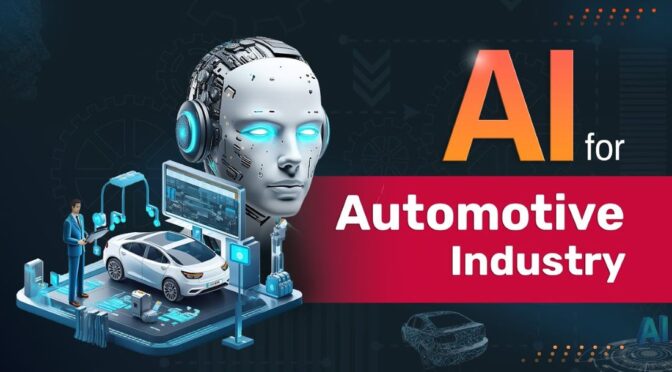With the world slowly becoming tech-savvy, Artificial Intelligence (AI) is making its mark across various sectors. Just like many other business sectors, the automotive industry is experiencing a profound transformation by embracing AI.
Imagine a world where your car anticipates your needs, drives you safely to your destination, and even assists in making eco-friendly decisions. Sounds like science fiction? Well, this is the reality AI is creating in the automotive industry.
The automotive AI market exceeded $6 billion in 2022 and is expected to grow at a CAGR (Compound Annual Growth Rate) of over 55% by 2032.
AI in the automotive sector is not just about making cars smarter but also about developing a safer, more efficient, and enjoyable driving experience. From autonomous driving to predictive maintenance and beyond, AI is at the heart of innovation in the automotive industry.
Curious about how AI is transforming the way we drive and interact with our vehicles? Let’s delve into the significance of artificial intelligence in the automotive industry.
The Role of AI in Reshaping the Automotive Industry
As businesses strive to stay ahead of the competition, understanding the role of AI in automotive innovation is essential.
Artificial intelligence helps cars sense and respond to their environment better, which is crucial for developing self-driving vehicles. These smart systems can recognize traffic signs, detect obstacles, and even make instant decisions to avoid accidents.
Besides driving, AI is also revolutionizing how cars are built and maintained. In manufacturing, AI-driven robots and systems ensure that production lines run smoothly and efficiently, reducing errors and speeding up processes. When it comes to maintenance, AI can predict problems before they take place and help car owners avoid costly repairs and breakdowns.
The integration of AI in the automotive industry also improves the overall customer experience. From personalized in-car settings to smart navigation systems, AI makes driving more pleasant and convenient.
Moreover, AI is not just an add-on feature but it’s also becoming the backbone of modern automotive technology, paving the way for a smarter and more connected future on the road.
How AI Innovations are Transforming the Automotive Sector
Artificial Intelligence has had a noteworthy impact on reshaping the automotive sector through its ever-evolving advancements. The following points show how AI technology continues to revolutionize the automobile industry.
1. Autonomous Vehicles
Artificial intelligence lies at the heart of autonomous vehicles, enabling cars to drive without human intervention. These self-driving cars use AI to analyze vast amounts of data from sensors and cameras to navigate roads, avoid obstacles, and make real-time decisions with minimal human input.
This technology is helpful as it can reduce accidents caused by human error, making roads safer and travel more convenient. Leading companies like Tesla and Waymo use AI to advance autonomous vehicle technology.
2. Predictive Maintenance
At present, most automobile companies leverage advanced technologies like artificial intelligence to better anticipate potential issues before they become serious problems. Such technologies analyze data from various car sensors and predict when parts are likely to fail.
Artificial intelligence helps minimize the risk of unexpected breakdowns and their repair costs, scheduling maintenance proactively. This ensures vehicle longevity as well as improves overall safety and reliability on the road.
Watch the video to better understand the impact of AI on the automotive Industry.
3. Enhanced Manufacturing
AI-powered robotics revolutionizes automotive manufacturing processes, including assembly, welding, and painting, improving precision and efficiency.
AI systems monitor the manufacturing process in real-time, detecting potential issues and defects. This leads to higher quality vehicles, faster production times, and reduced waste, which eventually cuts down manufacturing costs and expands profits for automobile companies.
4. Smart Navigation Systems
AI-powered smart navigation systems provide instant traffic updates and suggest the most convenient routes to take. These systems analyze the flow of traffic, conditions of roads, and even weather forecasts to help drivers avoid congestion and delays.
The integration of AI and deep learning improves the overall driving experience and reduces travel times by offering more accurate and dynamic route planning.
5. Better In-Car Experience
AI personalizes the in-car experience by learning driver preferences and adjusting settings accordingly. From temperature settings to seat positions and entertainment choices, AI tailors the vehicle environment based on individuals’ needs.
Additionally, AI-powered virtual assistants can help with navigation, make restaurant reservations, and even read messages, making journeys more comfortable and enjoyable.
6. Supply Chain Optimization
AI improves supply chain efficiency by predicting demand, managing inventory, and optimizing logistics. This ensures that parts and materials are available when needed and reduces delays and production halts.
Also, AI helps manufacturers respond quickly to market changes and maintain smooth production workflow by streamlining supply chain operations.
7. Advanced Driver Assistance Systems (ADAS)
Advanced driver assistance systems use artificial intelligence to improve vehicle safety features such as lane-keeping, collision avoidance, adaptive cruise control, and automatic emergency braking.
These AI-driven systems constantly monitor the vehicle’s surroundings and assist the driver in maintaining safe driving practices. ADAS helps reduce the risk of accidents and contributes to road safety and driver confidence.
The Future of AI in the Automotive Sector

As AI technology continues to evolve, we might experience more widespread adoption and integration of advanced software in car manufacturing. We can expect an increase in the autonomous segment in the automobile industry with the advancement of self-driving assistance technology.
These technological advancements and innovations are expected to offer smarter, safer, and more efficient in-car experiences in the upcoming days. Moreover, the integration of AI will pave the way for a more connected and advanced automotive world, transforming everyday driving into a seamless, enjoyable experience.




